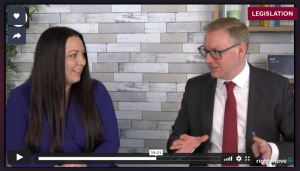Why is Legionella being discussed at the moment?
Some consultants and letting agents are using the revised guidance to suggest that new legislation has been imposed on landlords of domestic rented properties for managing and controlling the risks of exposure to Legionella bacteria of their tenants. This is wrong. The legislation has not changed and misinformation can impose unnecessary financial burdens on landlords where they are being charged for Legionella testing and certificates they don’t actually need.
What is Legionella?
Legionnaires’ disease is a pneumonia-like illness commonly caused by the inhalation of small droplets of contaminated water.
What does the law say?
- The Health and Safety Executive states: “There is a legal duty for landlords to assess and control the risk of exposure to legionella bacteria”.
- Section 3(2) of the Health and Safety at Work Act 1974 means that any relevant health and safety legislation places a duty of care on landlord for the health and safety of their tenants.
- Landlords must assess and control the risk of tenants being exposed to Legionella.
- This does not require an in-depth detailed assessment.
- The HSE does not recognise a ‘Legionella test certificate’ and health and safety law does not require landlords to obtain or produce one.
Testing requirements
- Most landlords can assess the risk themselves and do not need to be professionally trained.
- However, landlords can arrange for a competent person to carry out the assessment if they wish.
Control measures
To protect against Legionella, you can advise your landlords to:
- Flush out the water system before letting the property.
- Make sure cold water tanks have a tight lid to stop debris getting into the system.
- Set control parameters to make sure water is stored at the correct temperature.
- The hot water should be set so that the water is heated up to 60°C.
- Tenants should be advised to not interfere with the settings.
- Remove any unused pipework.
Tenants should be informed of all control measures
What can tenants do?
- Tell the landlord if problems occur with the water system or if the water is not heating properly.
- After a period of absence (such as a holiday or student accommodation left empty) tenants should run all taps for at least two minutes.
- Where showers are installed at the property and used regularly, the risks are reduced. However, tenants should be advised to regularly clean showerheads.
Record keeping
- Records of any assessments should be kept.
- Follow up checks need to be carried out periodically, such as when undertaking the annual gas safety check or routine maintenance visits.
The HSE guidance is available here.
What’s the penalty for non-compliance?
Although incredibly rare, breaches of Section 3 of the Health and Safety at Work Act 1974 could result in up to 2 years imprisonment, a fine of up to £20,000 or both. Here’s a link to the full legislation.
 Couldn’t join us live for our monthly News Hour webinar with Rightmove Legal & Compliance Director, David Cox?
Couldn’t join us live for our monthly News Hour webinar with Rightmove Legal & Compliance Director, David Cox? David joins Lisa on the webinar sofa each and every month to cover off the latest legislative updates affecting agents. In March we’ll be discussing Right to Rent along with the other hot topics in the news. Got a topic you’d like us to cover? Email us at hub@rightmove.co.uk.
David joins Lisa on the webinar sofa each and every month to cover off the latest legislative updates affecting agents. In March we’ll be discussing Right to Rent along with the other hot topics in the news. Got a topic you’d like us to cover? Email us at hub@rightmove.co.uk.